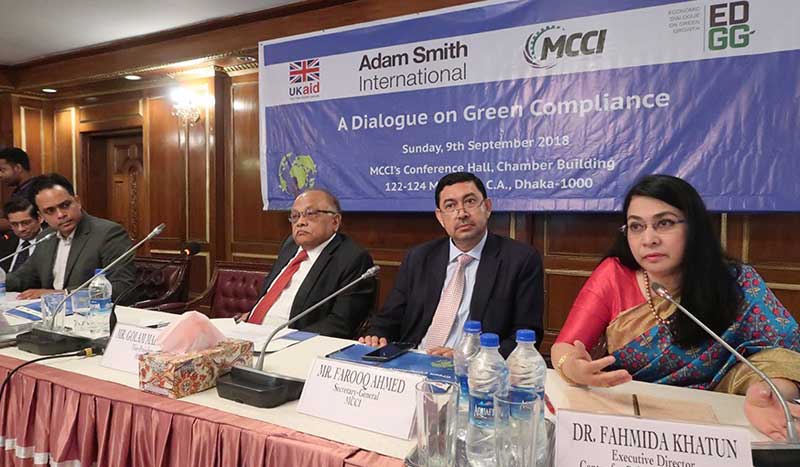Published in Dhaka Tribune on Sunday, 9 September 2018

The event was hosted by the Economic Dialogue on Green Growth (EDGG), a UKAID-funded program under Adam Smith International
Implementing green compliance issues in industrial sector requires policy support and enabling measures from the government to ensure green growth in the economy, experts said Sunday.
They said economic and non-economic incentives from the government along with commercial banks and financial institutions are of immense importance to encourage factories for opting green strategies.
They were speaking at a seminar titled ‘A Dialogue on Green Compliance’ at the auditorium of Metropolitan Chamber of Commerce and Industries (MCCI) in the capital.
Focusing on branding Bangladesh in modern and sustainable way, speakers said time has come for the Bangladeshi manufacturers to adopt own green compliance strategy to grab business opportunity in the global market.
The Dialogue was hosted by the Economic Dialogue on Green Growth (EDGG), a UKAID funded programme implemented by Adam Smith International.
Moderated by Adam Smith International country manager Suvojit Chattopadhyay, MCCI vice-president Golam Mainuddin, Center for Policy Dialogue (CPD) executive director Dr Fahmida Khatun, Department of Environment (DoE) director Syed Nazmul Ahsan, Marks and Spencer country head ShwapnaBhowmick, Bitopi Group managing director also BGMEA director Miran Ali, Viyellatex CEO KM RezaulHasanat and MCCI secretary general Farooq Ahmed spoke on the occasion.
Dr Shahpar Selim, a consultant, made the key note presentation on ‘Environmental Compliance Opportunities in the Bangladeshi Readymade Garments Industry: Lesson from the Green High Achievers’.
Being one of top readymade garments sourcing destinations, manufacturers have to abide by the compliance issues which traditionally and historically have been imposed by buyers or importers, said CPD executive director Dr Fahmida Khatun.
“Time has come now to voluntarily adopt green compliance issues. Because, this is not only the requirement of the buyers but also for growing the industrial sector”, she said.
CPD executive director said that green growth concept is conceived by western economies and it would be wise for the local industrialists to adopt a policy of their own to remain competitive in the global market, instead of following the western prescription.
Dr Fahmida Khatun said, “The green industry will have to advance in its own way. The government needs to provide policy support for this.”
“The power sector has to be further developed. For this, proper management of resources is needed. At the same time, the implementation of Green Project will be more transparent and accountable,” she added.
Terming Bangladesh as one of the success stories in the field of green products, world’s one of biggest multinational retailer company Marks & Spencer’s Country Manager ShwapnaBhowmick spoke on the indicators of success.
“Firstly, we have to sell Bangladesh in unique way. Earlier, we used to say about the low cost of Bangladeshi products and now we are highlighting to buyers about the quality and environment standards of such products. We have to be great marketer”, she said stressing for more value added products to reap benefit in the global market.
She also said that Marks and Spencer has 1400 stores globally and Bangladesh is one of the biggest souring country. It sources around 14 percent of its apparel products from Bangladesh.
Viyellatex CEO KM RezaulHasanat said that Bangladesh should be considered as green country as it emits only around 0.46 metric ton per person while EU countries per capita carbon emission rate is above 15 metric tons.
“Then why should we be needed to be certified, out products is already green”, he said.
MCCI secretary general Farooq Ahmed said that Bangladesh is one of the best countries in terms of policy, rules and regulations, but remains in the bottom line in terms of their implementation.
Bangladesh would get more results if implementation process is streamlined, he added.
Shahpar Selim said on her presentation, “Enabling measures that are needed for green factories include strong regulatory signals from the government, economic and non-economic incentives from the government, commercial banks and financial institutions, increase in absorptive capacity and expert knowledge sharing and public relations management.
She also said, A private-public sector engagement can help develop a more pragmatic roadmap to better support greening while keeping in mind the opportunity costs of compliance investments for different segments of the suppliers.
Key measures to encourage scaling up of greening in the RMG industry:
- Review of policies and institutional structures around environmental and water quality regulations. This will help overcome the lack of clear analysis on what resource pricing would incentivize expense conscious RMG firms to reconsider resources used.
- Compliance mapping along RMG clusters, regular monitoring and capacity building for cleaner production monitoring. There is a lack of updated and transparent pollution data for regulatory use and monitoring capacity that would be addressed through this measure.
- Review of economic incentives and duty structures would address the lack of clarity on conflicting price signals to RMG companies on greening.
- Review of the Green Transformation Fund and the Green Refinancing Fund would clarify understanding on what green financing products are available to medium and smaller RMG companies; and streamline access to finance for locally procured green tech solutions.
- Regional Cleaner Production Hubs. The major barrier is insufficient in depth and ‘just in time” information/solution options to RMG compliance teams.
- Knowledge Management and Network Building would allow for sustained dialogue at the topmost level on the achievements of scaled up greening, especially at the international level.
This approach was taken to demonstrate three things:
- Cost recovery possible in the medium to long term for investments that go beyond mandatory government and basic buyer requirements;
- What kind of barriers did the high achievers face and what lessons are there for other .RMG companies who may benefit from greening; and
- What kind of policy and institutional changes are needed to spread greening from the high achievers to the rest of the industry.


